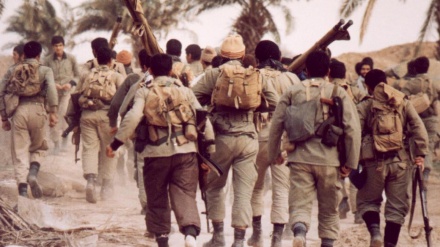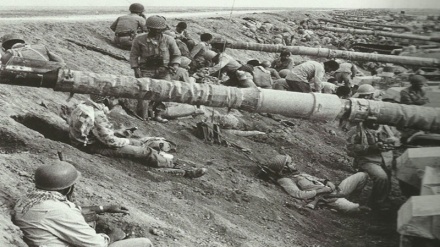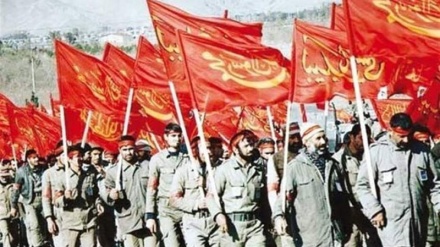Glimpses of Epic of 8-Year Holy Defense (55)
In a couple of weeks, we talked about a series of small-scale operations in the Iraq-Iran war and we came to Val-Fajr 4 operation on the western borders of Iran.
As the war machine of Saddam's regime had been seriously damaged in these operations, it targeted the cities and villages of Iran and targeted them with long-range missiles and air raids by bombers. In these criminal acts, hundreds of civilians were martyred most of them children and women.
If you remember, we also said that Imam Khomeini had rejected the request of some of the military commanders for retaliatory measures, emphasizing that the Iraqi people are also oppressed by Saddam, and they should not pay the price of the dictator's crimes. The founder of the Islamic Republic of Iran, according to Islamic teachings, emphasized that we have to fight fairly in order to repulse the aggression.
Concurrent with bombardment and missile attacks against Iranian cities and villages, Saddam dastardly tried to halt Iran's oil exports by targeting Iranian tankers, terminals and ports to compensate for its failures on the battlefield with brave Iranian men. To further embolden Saddam, France delivered a massive military aid to him in targeting Iranian oil tankers, ports and terminals in the Persian Gulf. The French regime handed over five Super Etendard aircraft to the Iraqi air force along with pilots and crew in October 1983.
The then French Foreign Minister Claude Chaisson said creation of a military balance in the Ira-Iran war, as well as what he called "Iraq's peaceful tendencies" and its rejection by Iran has been the French government's incentive to deliver these aircraft to Iraq.
The transfer of these aircrafts to Saddam strengthened the Iraqi air force to attack Iranian ships along Khor Musa area to Khark Island. From the beginning of Saddam's invasion of the Islamic Republic of Iran, France always assisted the dictatorial regime in Iraq. In addition to political and diplomatic assistance, France accepted the MKO terrorist group in its country and provided them with greater organization and access to various countries, including Iraq. France was also the base for organizing the MKO terrorists and transferring them to Iraq to develop a military organization to fight Iran. This trend has persisted till date. Through the MKO headquarters in France, members of this grouplet were transferred to Iraq from different countries and organized military operations there.
The MKO intelligence and operational headquarters were based in Paris from where they would carry out espionage on Iran's fronts and the country's conditions. Imam Khomeini, in reaction to expansion of refuge to the MKO terrorists in France, said on November, 22,1983:
“The French nation should sense that how you have praised France and what you wrote and done about it, at this juncture, this government destroyed the French reputation. Wherever there is a republic it is the nation which should take control of basic things. I do not accept the French nation to say it is our government. The nation of France should think of preserving its reputation which is being destroyed, put the government in its place and abandon it. This is the government which should be named the biggest terrorist, for, all terrorists have gathered in France, and then it carries out terrorist act. Since the French government has claim on Iraq but Iraq cannot pay it, so, it retaliates over Iranians.”
The delivery of French airplanes and missiles to Saddam's regime enhanced the capabilities of the Iraqi air force to attack Iran's oil exporting centers. Many of the Iraqi attacks caused oil spills on the surface of the sea, causing environmental pollution in the Persian Gulf.
Iraqi attacks on oil platforms and some Iranian refineries reduced oil production in Abadan, Tehran, Shiraz and Kermanshah refineries to less than half. According to the Iranian prime minister's report of January 16, 1983, Iran had suffered $56 billion losses when the Iraqi army invaded the country's oil facilities. Khark Island, as the most important Iranian export terminal from the beginning to the end of the war, was one of the permanent targets of Iraqi airstrikes. Iran had deployed its strongest air defense system, including a Hag missile base on the island. Despite the air strikes on the island's quays and oil tanks, the oil exports from the island were never cut off till the end of the war. Officials of the Islamic Republic of Iran repeatedly announced that the Islamic Republic was the only country which could guarantee peace and security in the Persian Gulf in the wake of increased attacks on terminals and oil tankers. However, they stressed that if Iran was not able to export oil from the Persian Gulf, the oil of none of the Persian Gulf littoral states would be passed from the Strait of Hormuz. This reaction of Iran to the Iraqi attacks on terminals and oil tankers with the help of the Persian Gulf Sheikdoms and western regimes led to reactions at the regional and international levels.
Japan's Foreign Minister called for the end of war at the meeting of October,7,1983 with the Speaker of the Islamic Consultative Assembly. In response to him, the Islamic Republic of Iran declared that we are seeking peace, but without securing our peace conditions, we will not have peace. On the other hand, he was asked to give up the transfer of the remaining 2 billion credits that Japan was supposed to give to Iraq, but, noting that this was a credit for non-war expenditures, Japan's assistance to Iraq continued.
With the superiority of the Islamic Republic of Iran on the battlefields, Saddam's supporters arrived in the arena to confront the Islamic Republic of Iran directly. Following the Iraqi threat of attacking Iranian oil installations in the Persian Gulf and Iran's severe response to the threat, some of the Arab regimes in the Persian Gulf urged the US to have military presence in the region. The US regime took advantage of this opportunity and the American war department prepared a plan to protect what it calls "the US interests" in the Persian Gulf oil fields. Under this plan, an organization called "Rapid Reaction Force" was established. With the increase of Iraqi attacks in the Persian Gulf and Iran's warning on blockading the Strait of Hormuz on the condition of Iraqi targeting of Iranian tankers, the US dispatched 2,000 Marines from Beirut to the Indian Ocean and from there to the Persian Gulf. The aircraft carrier Ranger along with six other ships set out to the Indian Ocean in October 1983.
Upon the increase of Iraqi assaults on ships in the Persian Gulf, as well as attacks on residential areas, then UN Secretary General Javier Perez de Cuellar sent an investigative delegation to Iran and Iraq. The panel issued a report on heavy losses in Iranian cities and residential areas caused by Iraqi air and missile strikes. The report formed the basis for the issuance of Security Council resolution 540. The draft resolution was presented to the Security Council by the three countries, Zaire, Togo and Guyana. The resolution was issued on October 31, 1983, following the spread of the war in the Persian Gulf and the Iraqi usage of French Super-Etendard and Exocet missiles. Resolution 540 was the fourth resolution on the Iraq-Iran war, which was placed on the agenda of the Security Council, and eventually passed by 12 votes in favor and abstentions by the countries of Malta, Pakistan and Nicaragua. The resolution, for the first time, mentioned the realistic review of the war and called on the Secretary-General to start consultations with both parties for stopping the war; although there was no mention of the aggressor and the costs of losses and casualties of the aggression on the invaded country.
FK/ME


